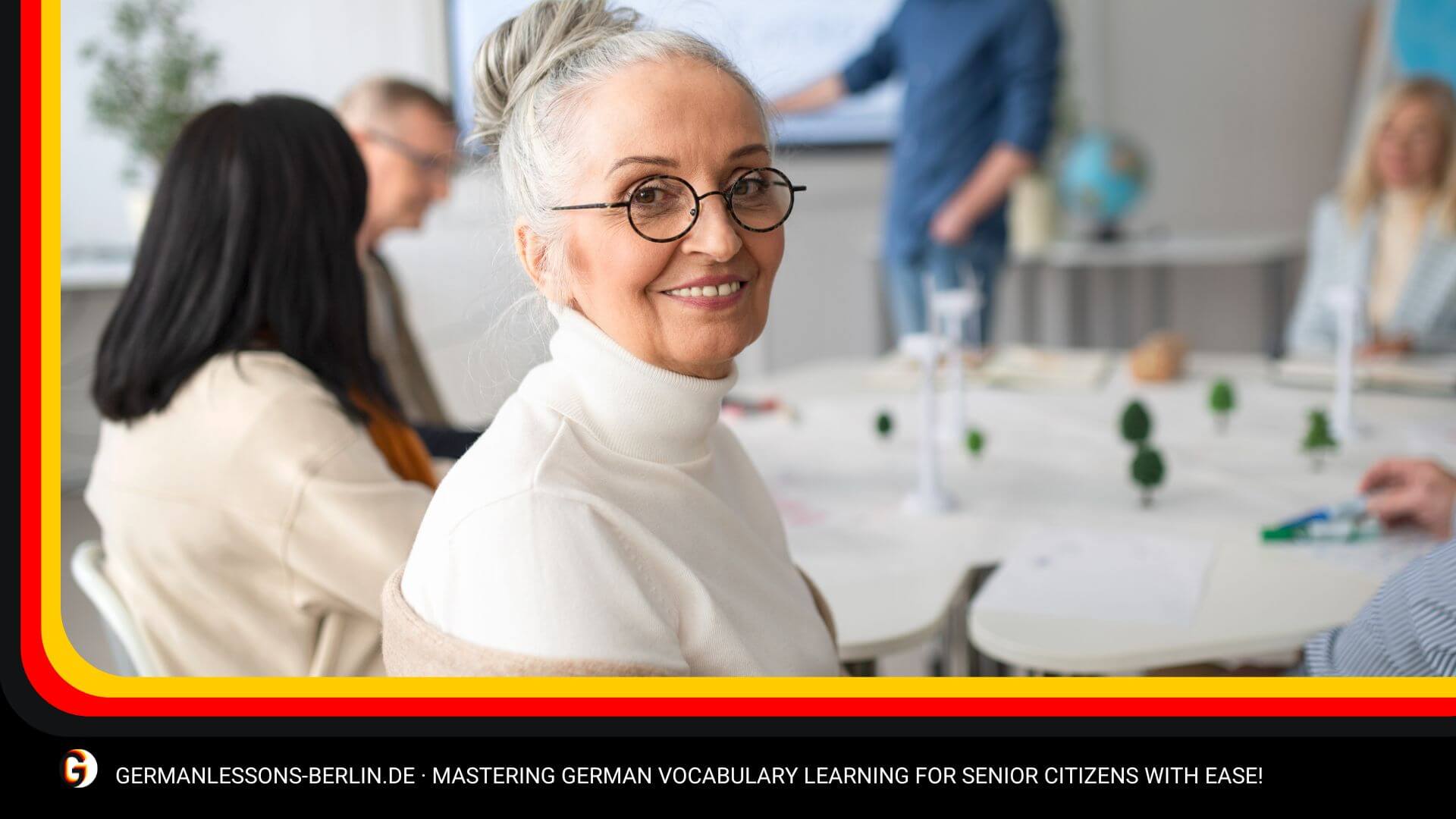Table of Contents
Embarking on the exciting journey of learning a new language later in life is a bold and inspiring choice. As I delve into the world of German Vocabulary Learning for Senior Citizens, I am thrilled to share insights into acquiring German vocabulary for beginners, utilizing engaging audio tools, and laying a solid foundation of the German language basics. Whether you’re looking to connect with your heritage, travel, or simply enjoy the cognitive benefits of language learning, starting with core vocabulary and phrases is the way to go. Moreover, it’s easier than ever to learn German words with audio, which supports correct pronunciation and understanding as you gain confidence in your newfound skills.
Key Takeaways
- Starting with basics streamlines German language learning, making it approachable for seniors.
- Audio lessons are instrumental in grasping pronunciation and usage of German vocabulary for beginners.
- Building a robust vocabulary creates confidence to engage in simple conversations.
- Consistent listening and practice with audio materials can accelerate learning.
- Savoring the process and celebrating small victories leads to enjoyable and effective German language basics mastery.
Embracing the Challenge: Why Learn German in Your Senior Years
As we age, the prospect of learning a new language can seem daunting. However, the cognitive benefits of language learning, particularly for seniors, present compelling reasons to take up this challenge. It’s an investment in your mental acuity, providing not just mental stimulation through language learning, but also safeguarding long-term brain health. Learning German as a senior can be one of the most enriching decisions, opening up avenues to not only learn a new skill but also embrace a cultural journey.
The Cognitive Benefits of Language Learning for Seniors
To understand how learning German for brain health can impact your well-being, it’s important to explore the cognitive enhancements it offers. Neuroplasticity—the brain’s remarkable ability to form new neural connections at any age—is fortified through learning a foreign language. This process can not only sharpen your mind but also potentially defer cognitive decline, with studies suggesting an up to five-year delay in the onset of dementia symptoms for bilinguals.
- Learning German reignites the brain’s learning capabilities, akin to a vigorous workout.
- The active recall and comprehension involved in language learning supports executive functions.
- Regular engagement with a new language enriches mental agility and attention to detail.
German as a Key to Cultural Riches
Unlock the treasure trove that is the German cultural realm. Learning a foreign language as a senior is not just about acquiring communication skills—it’s a gateway to embracing German history and arts. Imagine experiencing the works of Goethe, absorbing the intrigue of German films, and exploring the profound insights of Nietzsche, all in their original language. This is the kind of German language cultural experience that awaits you.
| Cultural Aspects | Benefits of Learning German |
|---|---|
| Literature | Deeper appreciation for classics and modern works |
| Cinema | Access to original dialogues, capturing the essence of storytelling |
| History & Arts | Enhanced understanding of historical events and artistic movements |
| Contemporary Media | Engagement with current affairs and trends in German-speaking regions |
The pursuit of learning German for cultural enrichment not only fosters a connection with German-speaking communities but also fuels a passion for lifelong learning. By exploring German-speaking cultures, you transcend language barriers and enrich your life with a new dimension of worldly knowledge and experiences.
First Steps in German: Navigating the Basics
Embarking on Basic German Lessons for Beginners is a delightful challenge that I find both refreshing and immensely rewarding. With each passing day, as my familiarity with essential German vocabulary grows, I embrace more of the intriguing world of German language learning. I understand the importance of setting a strong foundation with German language basics, which not only boosts my confidence but also fosters a deeper appreciation for the language’s structure and beauty.
My learning journey begins with simple yet crucial steps that involve immersing myself in the essentials: vocabulary, sentence construction, and correct pronunciation. It’s these stepping stones that pave the path towards fluency, and I am here to share how even the most complex language pursuits can start with a few basic building blocks.
- Commit to daily practice with fundamental words and phrases.
- Incorporate repetition to solidify newly learned vocabulary.
- Focus on clear and accurate pronunciation from the start.
- Engage with simple sentences to understand grammar and context.
- Use technology to enhance learning with apps and audio resources.
Turning these practices into habit, I am pleasantly surprised at how quickly the nuances of German begin to feel more natural to me. It underscores the notion that no matter the age, we have the capacity to absorb and cultivate new skills.
| Essential Vocabulary | Pronunciation Tips | Sentence Building |
|---|---|---|
| Greetings and Basics (Hallo, Danke) | Listen and repeat after native speakers | Using vocabulary in simple structures (Ich heiße…) |
| Numbers and Dates (Eins, Zwei, Drei) | Break words into syllables | Construct basic questions (Wie viel kostet das?) |
| Common Verbs (Gehen, Kommen) | Practice the challenging ‘ch’ and ‘r’ sounds | Formulate phrases with verbs (Ich gehe zum Markt.) |
| Adjectives and Colors (Groß, Klein, Blau) | Rhythm and melody of common phrases | Describe objects and people (Das ist ein rotes Auto.) |
Above all, my experience reiterates an important lesson that applies not only to language learning but to life itself: staying curious and open-minded. So, as I layer my knowledge of German, day by day, I cherish every small triumph along the way.
I’ve learned that starting with Basic German Lessons for Beginners creates a robust groundwork for future language endeavors. The most intricate concepts become manageable when approached with patience and consistent effort.
- Consistency is key—regular practice is more effective than occasional lengthy sessions.
- Quality over quantity is crucial—understanding a few phrases well is more beneficial than memorizing many words poorly.
- Embrace mistakes as they are valuable learning opportunities.
As I continue my delightful sojourn into the German language basics, I visualize myself not only conversing with ease but also engaging with German culture on a deeper level. I encourage all who read this to take that first step and join me in this linguistic adventure.
Utilizing Audio Lessons for Effective Vocabulary Acquisition
When I embarked on the quest to learn German words with audio, I discovered a world where the harmony of sound and meaning became a rhythmic guide to language acquisition. My daily ritual of indulging in German vocabulary audio lessons has proven to be an invaluable asset in my learning journey. The convenience and effectiveness of German language audio support allows me to anchor the intricacies of pronunciation and usage securely into my memory.
German Vocabulary Basics With Audio Support
Audio support provides me with the immediate feedback necessary for correcting and refining my pronunciation, which is a cornerstone to mastering any new language. Through repeated exposure to the authentic sounds of German, I am able to mimic nuances that would otherwise go unnoticed. As I integrate audio learning into my routine, each word becomes a building block, contributing to a growing edifice of language skills.
Listen and Learn: Integrating Audio into Daily Practice
Integrating audio learning into daily German vocabulary practice serves as a catalyst for progress. As I make active listening German exercises a part of my day, I notice an uptick in my ability to comprehend and respond more naturally during conversations. The beauty of these exercises is that they can be woven into the tapestry of daily activities—while taking a walk, during a morning commute, or in the tranquil moments before sleep.
Delving deeper into the acoustic realm of the German language, I find that there’s more to audio learning than just listening—it’s an immersive experience. Each carefully articulated syllable is a stepping stone towards a profound understanding of how words fit together in real-life dialogues, stories, and discourses. This process is as much about cultural immersion as it is about language proficiency.
| Audio Learning Components | Benefits |
|---|---|
| Pronunciation Clarity | Reduction of linguistic errors |
| Rhythmic Patterns | Better grasp of sentence structure |
| Vocabulary Contextualization | Enhanced memory retention |
| Natural Speech Examples | Boost in conversational confidence |
In my pursuit to learn German words with audio, I have uncovered a plethora of resources that make learning not just functional, but genuinely enjoyable. My tools range from audio books and podcasts to language learning platforms that all contribute to a well-rounded approach to vocabulary acquisition. I attribute a significant part of my linguistic growth to this auditory dimension, which has enabled me to absorb and appreciate the melodic quality of German.
Immersing oneself in the organic flow of a language through audio brings about a natural ease with words and the confidence to use them.
- Affirms the correct noun genders and article usage through consistent exposure.
- Facilitates an intuitive grasp on verb conjugations and tenses in context.
- Strengthens the ability to understand diverse dialects and speaking speeds.
As I move forward on this path, I remain committed to daily German vocabulary practice with a special focus on integrating audio learning. The sound of the German language offers not just a way to communicate, but also an auditory landscape of cultural richesse, beckoning to be explored and enjoyed.
Overcoming the Fear of Speaking: Communication is Key
As I delve deeper into the rewarding process of German Vocabulary Learning for Senior Citizens, I recognize that building German language speaking confidence is about more than just memorizing words and phrases—it’s about overcoming the trepidation of actual conversation. It’s natural to feel a bit intimidated at first, but the true advancement comes from practical interaction and active use of the German communication skills I’m acquiring.
The key to breaking through the initial barrier is not just understanding the lexicon, but daring to speak it out loud. Conversations bring language to life. I make it a point to embrace every opportunity to articulate my thoughts in German, whether it’s a simple “Bitte?” (please?) or a more complex “Was bedeutet das?” (What does that mean?). And in each of these interactions, I find my hesitation receding and my confidence taking its place.
- Engaging regularly in conversation with native German speakers.
- Not shying away from asking questions: “Was meinst du/meinen Sie genau?” (What do you mean exactly?).
- Seeing every mistake as a stepping stone towards improvement.
- Reminding myself that proficiency comes with practice and patience.
One strategy I found particularly supportive in my endeavor is participating in German discussion groups. Engaging with peers on topics ranging from daily life to world affairs encourages me to use newly learned vocabulary in context.
I am no longer intimidated by the accents and the umlauts; instead, I see them as a welcomed challenge that adds to the authenticity of the learning experience.
Here’s a comparison of my speaking confidence levels at different stages of my German learning journey:
| Timeframe | Confidence Level | Active Vocabulary Usage |
|---|---|---|
| Initial Weeks | Low | Minimal; primarily greetings and common phrases |
| After 3 Months | Moderate | Increased; basic conversations on familiar topics |
| Current Status | High | Extensive; confidently participating in discussions |
The table illustrates the remarkable transformation in how I approach speaking German. It shows that not only my German Vocabulary has expanded but also reflects a noticeable rise in the ease with which I communicate. Achieving this milestone has been a testament to the necessity of engaging actively with the language.
I’ve come to cherish the nuances of German conversation—its rhythm, its cadence, and even its complexity. It excites me to know that with each passing day, I’m not only learning a language but embracing a vital form of human connection.
Essential Tools and Resources for Learning German
When it comes to expanding my German vocabulary and enhancing my understanding of the language’s structure, I’ve discovered that utilizing the right technological resources for learning German plays a crucial role. I’ve delved into a range of German language learning apps and German vocabulary books that cater to senior learners like myself, offering a blend of engaging exercises and comprehensive content tailored to various learning stages.
German Language Learning Apps Tailored for Senior Learners
My experience with German vocabulary apps has been nothing short of transformative. These language apps for seniors have not only been convenient but also incredibly effective for fitting study into my everyday life. My top recommendations include Duolingo, Memrise, Rype, Babbel, and FluentU. Each of these platforms provides an accessible way for me to strengthen my German grammar resources and overall fluency.
- Duolingo makes learning fun and game-like, keeping me motivated with streaks and rewards.
- Memrise utilizes mnemonic techniques to make memorizing German words a breeze.
- I’ve relished in the personalized instruction offered by Rype, which connects me with a tutor for tailored, one-on-one sessions.
- Babbel has enriched my conversational skills by focusing on the language’s practical use in real-life scenarios.
- Through FluentU, I engage with authentic video content, which helps me understand German as it is spoken by native speakers.
Selecting the Right German Vocabulary Books for Your Level
Finding the right German vocabulary books is vital for comprehensive language learning. I’ve learned that a progressive approach to studying grammar and vocabulary is important. Starting with titles like “Beginner German: A Grammar and Workbook” and progressing to “Intermediate German: A Grammar and Workbook“, I have steadily built a foundation for more advanced books tailored for German learning.
However, as I’ve ventured further, advanced grammar books have become my steadfast companions in this journey. Here’s a look at the structured path I’ve followed using some recommended titles:
| Stage | German Grammar Book | Purpose |
|---|---|---|
| Beginner | Beginner German: A Grammar and Workbook | Laying the groundwork for basic grammar and vocabulary |
| Intermediate | Intermediate German: A Grammar and Workbook | Building on established knowledge with more complex structures |
| Advanced | Grundstufen-Grammatik für Deutsch als Fremdsprache | Delving into specialized topics and fine-tuning language skills |
By continuously aligning the language textbooks for German learning with my current proficiency level, I maintain a steady pace of improvement. It’s this strategic selection of resources that aids me in nurturing my language abilities, ensuring each study session is both productive and rewarding.
By intertwining the interactive digital resources with the insightful German vocabulary books, I am confidently navigating the path of mastering the German language—bei jedem Schritt (with every step).
Creative Techniques for Retaining New German Vocabulary
Embarking on the delightful challenge of learning a new language in my later years, I’ve found that employing creative language learning strategies can be incredibly effective. In my quest to enrich my lexicon, I’ve been embracing German vocabulary memorization techniques that are both enjoyable and efficient. Let’s dive into some of the innovative methods I’ve tailored to my own learning style that help in retaining German vocabulary.
The cornerstone of my strategy has been the use of flashcards. But these aren’t your average flashcards—each card is a mini treasure-trove of information, complete with a vivid picture related to the word, its synonym, and a sentence that places it in context. This visual and contextual approach aids in carving each new word into my memory.
Here’s an insight into how I structure my flashcard sets:
| German Word | Image | Synonyms | Example Sentence |
|---|---|---|---|
| Schmetterling | A colorful butterfly | Falter | Der Schmetterling flattert im Garten. |
| Freiheit | A bird flying in the sky | Unabhängigkeit | Freiheit ist ein wertvolles Gut. |
| Freundlich | Smiling faces | Herzlich | Sie ist immer sehr freundlich zu mir. |
Another mnemonic device that I find incredibly helpful is the method of loci, also known as the memory palace technique. By associating German words with specific locations within an imaginary space, I improve my ability to recall them. This method plays upon the brain’s natural spatial memory and is a game-changer for me.
Additionally, I frequently engage in context-based learning methods. For instance, I create small stories using new vocabulary, which not only helps me remember words but also gives me practice in stringing them together into coherent narratives. It’s a stimulating exercise that feels more like fun than study, and it genuinely enhances my retention rates.
Turning learning into a creative endeavor has transformed the way I absorb and retain German vocabulary. It’s no longer about rote memorization but about making each word meaningful and memorable through strategic play with language.
Employing these techniques, bolstered by a positive and persistent attitude, has made a remarkable difference. I’ve compiled a few more methods that might spark your own imagination:
- Associate words with personal memories or funny anecdotes.
- Use rhyme or songs to memorize difficult vocabulary.
- Create a personalized German vocabulary journal with doodles and illustrations.
Integrating these various techniques into my daily study routine has not only made the journey of learning German a joyous one but has also greatly improved my ability to retain and utilize new vocabulary with ease.
Incorporating German into Your Everyday Life for Immersion
Immersing myself in the German language has been a delightful and enriching part of my daily routine. To truly grasp the intricacies of German, I’ve turned to German media for learning and leaned heavily on German vocabulary immersion as practical ways to reinforce my language skills. The use of German entertainment as educational tools can transform a regular day into an immersive linguistic experience without ever leaving home.
German Media and Entertainment as Learning Aids
Integrating German films, music, and news into my life has been instrumental in enhancing my language acquisition process. They provide authentic language exposure and make learning German words more meaningful by presenting them in context. Through the power of multimedia, each word associates itself with experiences and emotions, making retention much more effortless and engaging.
- Watching German films helps me understand the cultural nuances and idiomatic language.
- Listening to German music has been a fun way to learn colloquial expressions and improve my listening comprehension.
- Following German-language news channels keeps me updated with current events while teaching me the formal register of the language.
In the spirit of diversity, I’ve crafted a weekly schedule that includes various forms of media to round out my learning experience. Here’s a glimpse:
| Day | German Media Activity | Purpose |
|---|---|---|
| Monday | Watch a German movie | Cultural understanding and listening skills |
| Wednesday | Listen to German radio | Vocabulary building and auditory discrimination |
| Friday | Subscribe to a German YouTube channel | Visual learning and context familiarization |
| Sunday | Read a German newspaper online | Insight into contemporary issues and technical vocabulary |
By weaving German media seamlessly into the fabric of my daily life, every moment becomes a chance to engage with the language in a fresh and exciting way. It’s about embracing the language holistically, beyond the textbook, and truly living it.
For those who may not have ready access to certain German media platforms, I’ve found that tools like VPNs are a helpful way to bypass regional restrictions, ensuring a rich and varied media diet. Whether it’s a gritty Krimi, a soul-stirring Schlager song, or an in-depth Arte documentary, I’m there with my ears and mind open, soaking it in, and growing my German vocabulary one word at a time.
My approach to learning is proactive and playful, understanding that language is a living thing best experienced in vibrant, authentic contexts. So, I tune in, turn on, and immerse fully, knowing that each piece of German media is another thread woven into my language tapestry. It’s a beautiful, intricate, and ongoing artwork that never ceases to amaze me with its depth and color.
Conclusion: Celebrating the Journey of Lifelong German Language Learning
My adventure into the realms of lifelong German language learning has proven to be as fulfilling as it is enlightening. Tackling German vocabulary mastery as a senior citizen has not only sharpened my mind but also brought me closer to a culture rich with history and artistry. Each step of this language journey has fostered a sense of personal growth and cognitive strength that surpasses my initial expectations. The journey has afforded me a unique lens through which to view the world, immersing me in a heritage that is now part of my daily lexicon.
The benefits of German vocabulary mastery can hardly be overstated. They weave through the colorful tapestry of everyday life, bringing new opportunities for engagement and understanding. The flexibility of the resources available today—from innovative apps like Babbel to the traditional thoroughness of grammar workbooks—has empowered me to remain steadfast in my commitment to this intellectual pursuit. For fellow senior citizens looking to embark on their own language journey, I stand testament to the joy and rewards that come with the challenge.
Ultimately, embracing the German language has been transformative, serving as a reminder that life’s potential for growth and enrichment knows no age. I revel in the connections I’ve built, the cultures I’ve explored, and the sense of accomplishment that comes with every conversation held and article read. As I look back on my time spent learning and living German, I am heartened by the beauty of this linguistic journey—one that has deeply enriched my golden years.
FAQ
Can senior citizens effectively learn German vocabulary?
Absolutely, senior citizens can master the German language by focusing on vocabulary using both traditional and digital resources. The learning process can be made engaging and quite manageable with the right approach and materials.
What cognitive benefits does language learning offer to seniors?
Learning a language like German provides mental exercise that can enhance neuroplasticity, potentially delay the onset of dementia, and bolster executive functions, leading to improved brain health.
How does learning German enrich the cultural experiences of seniors?
Learning German opens up access to the rich cultural heritage of the German-speaking world, allowing seniors to enjoy literature, films, and the arts more deeply and engage with contemporary media in the original language.
What are the basics that senior citizens should focus on when learning German?
Seniors should concentrate on essential German vocabulary, basic grammatical structures, and correct pronunciation. Mastering these foundations can set the stage for more advanced language learning.
Why are audio lessons effective for seniors learning German vocabulary?
Audio lessons support learning by allowing seniors to hear proper pronunciation and usage, and they cater to the auditory learning style, making memorization and understanding more accessible.
How can seniors overcome the fear of speaking German?
By actively engaging in conversations, making use of audio supports, asking questions, and not being afraid of making mistakes, seniors can build confidence and improve their German-speaking skills.
What German language learning apps are suitable for senior learners?
Apps like Duolingo, Memrise, Rype, Babbel, and FluentU offer lessons designed for various proficiency levels, with interactive exercises and personalized instruction that can aid seniors in learning German.
How should seniors choose German vocabulary books for their learning level?
Select books appropriate for their current proficiency, such as “Beginner German: A Grammar and Workbook” for starters, and progressively move on to more advanced texts to continuously improve their skills.
What creative techniques can seniors use to retain new German vocabulary?
Flashcards, mnemonic devices, and context-based learning are excellent strategies. These methods can help seniors memorize and retain new words more effectively.
In what ways can seniors immerse themselves in the German language?
Immersion can be achieved by incorporating German media and entertainment into daily life. Watching German films, listening to German music, and following German-language news are practical ways to practice and reinforce language skills.








